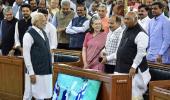The BJP is the preferred choice because it offers what the Mughals and later British offered in their time: A stable polity and an environment in which business could function, explains T N Ninan.

The paradox of the Indian business scene today is that the Bharatiya Janata Party's electoral victories have been cheered resoundingly on the stock market, while many businessmen are fearful of the party's government in New Delhi.
It was four years ago when Rahul Bajaj (now no more) told Amit A Shah that industrialists were afraid to criticise the government because they feared that 'it would not be appreciated'.
He also said that none of his industrialist friends would dare to admit as much.
And he compared it with the days of the Manmohan Singh government when anyone could criticise freely.
In response, Mr Shah said that his government had faced more criticism than any other, in Parliament and outside, and there was no need to fear the government's response.
Nor, he added, was it the government's intention to make anyone afraid.
But ad hoc soundings show that businessmen continue to be wary of the government and its 'agencies'.
Business lobby groups say they have been advised to not criticise in public.
But the stock market -- evidently reflecting foreign institutional as well as domestic investor enthusiasm -- has no fear, only hope.
What businessmen would like, one hears often, is for the Narendra D Modi government to return after next summer's election, but as a minority, and therefore in need of coalition partners who might put brakes on any high-handed action.
Stories are told of how companies being eyed by favoured businessmen find their owners getting the attention of the taxman.
After a target company changes hands, nothing is heard of the tax matter.
Businessmen intending to bid at auctions as part of the bankruptcy process are apparently advised to stay away while someone more in favour wins the auction. And so on.
Yet businessmen prefer the Modi government because it has taken several steps that are business-friendly: The corporate tax rate has been lowered, and tariff and non-tariff protection is being given to domestic producers against imported competition (most Indian businessmen, including Rahul Bajaj, were never great votaries of globalisation).
Indirect taxation has been reformed, subsidies are being offered for investment, and incentives for increased production.
And there is unprecedented public investment in the physical infrastructure. What's to criticise?
What businessmen see the Modi government offering are stability and continuity.
No one wants a repeat of the chaos of past coalition governments (the likely alternative on the very remote possibility of a non-BJP government, post-elections), or the policy paralysis of the later years of the Manmohan Singh government.
Whether there is less 'tax terrorism' now than under Congress rule is possibly an open question, but there is also another factor.
The current Congress message offers primarily welfarism and freebies, translated to mean fiscal irresponsibility.
The party offers no accompanying pro-business message.

History offers loose parallels. As Tirthankar Roy, the economic historian, explains in his A Business History of India, the expansion of the Mughal empire enabled an economic climate in which businessmen (mostly Punjabi Khatris and traders from Marwar) could move east as 'Pax Mughaliana" spread all the way to Bengal.
When the Mughal decline led to turmoil, says Mr Roy, businessmen shifted to the places where stability and an escape from feudalism were on offer: The British-ruled port towns of Bombay, Madras, and Calcutta.
So it wasn't just Mir Jaffer who secretly supported Clive at Plassey; so did Jagat Seth, the most important businessman of the time.
Indian merchants expressed pro-East India Company views even during the revolt of 1857.
But Mr Roy quotes the historian of Britain and its empire, Chris Bayly, as saying it was an uneasy interdependence between Indian capitalism and the British.
The point is that businessmen look to prosper; what they seek to minimise is uncertainty, which denotes risk.
Beyond that they are politically agnostic. They were unhappy with the Congress right up to the 1980s because of its policies, and changed their stance only after the 1991 reforms.
Now the BJP is the preferred choice because it offers what the Mughals and later British offered in their time: A stable polity and an environment in which business could function.
As Mark Twain said, history may not repeat itself, but it often rhymes.
Feature Presentation: Aslam Hunani/Rediff.com










